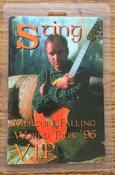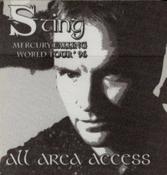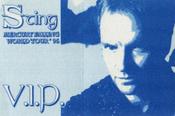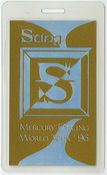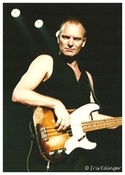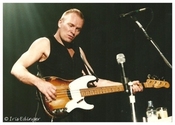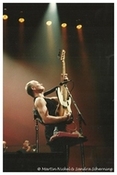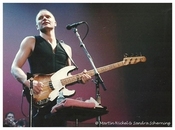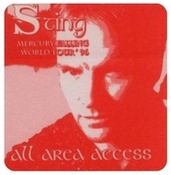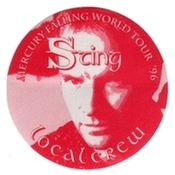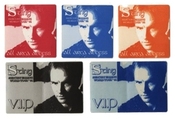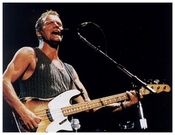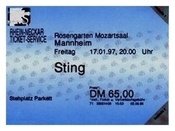
Mercury Falling
Aesthete with Muscles - Sting performed at Mannheim's Rosengarten...
When a megastar like Sting announces his arrival, the house is naturally packed; the Mozart Hall at Mannheim's Rosengarten is sold out, because the former Police frontman is one of the few pop-rock artists who enjoys equal acclaim from the press and the public. However, before Sting swings his bass guitar and lets his original vocal talent ring out, another, a truly beautiful voice, yet still unknown in this country, is allowed to delight the audience.
Soraya is the name of the young, pretty Colombian who has garnered considerable success in her home country and much praise elsewhere for her songs in the American-inspired singer/songwriter tradition. With her first international album release, "On Nights Like This," under her belt and a seasoned backing band behind her, she delivers harmoniously slinky songs that occasionally reveal that the South American singer has been musically influenced by Joni Mitchell and Ricky Lee Jones. However, songs like "Sweet Love" and "Suddenly" are sometimes a bit too beautiful and sweet; a little more bite wouldn't hurt.
Sting, on the other hand, has acquired a bit of mellowness with age, a fact that even the black muscle shirt stretched over his well-trained torso can't disguise. The 45-year-old Englishman (real name Gordon Matthew Sumner) had already attracted attention with solo ventures before the Police split up, and consistently continued the hit series that the trio hadn't abandoned since the late 1970s with his own productions. He also earned merit as a film actor in "Dune" and the Frankenstein adaptation "The Bride." He interpreted Brecht/Weill songs from The Threepenny Opera, sang a duet with Pavarotti, and earned a solid reputation as a politically engaged artist and intellectual aesthete—an exceptional phenomenon in the pop industry; some even consider him a "shining light."
Despite the high quality of his compositions, which don't rely on simple, standard rock formulas but feature artful, jazzy arrangements; despite the excellent musicianship of his five-person backing band (including saxophone and trombone), and despite the concert being tastefully accompanied by a sophisticated light show—there are still a few drawbacks.
On the one hand, the acoustics are not exactly overwhelming; they have achieved better sound in the Mozart Hall. The repertoire presented on his latest album, Mercury Falling, also reveals a phenomenon to which even Sting isn't immune: It's the old Police numbers like Every Breath You Take or Roxanne, where the audience goes wild, comparatively speaking, after previously applauding loudly and politely, but with restraint. And the star himself, whose voice has had more power in the past, isn't as compelling as he could be; there's a lack of energy and spontaneity throughout the entire performance.
(c) Mannheimer Morgen by Mike Seifert
The brooding powerhouse - Perhaps as good as never before: English pop musician Sting makes a stop at Mannheim's Rosengarten on his tour.
Sting is in a hurry this time. With sweeping strides and grand gestures, he storms onto the stage and, without much pause for breath, launches into a sequence of twenty songs spanning almost two decades. The man with the brooding penchant for murky melodies and witty, dark verses has had his head shaved almost bald, pushes his muscular arms out of a black shirt, and has his bulky electric bass guitar glued to his body like a hard rocker. The muscular pop star radiates strength and vitality; his show is loud and colourful, and perhaps as good as ever. As if he wanted to quote the old, melancholy Sting, he leans against the speaker tower at the edge of the stage, rests his chin pensively on his hand, and gazes silently into the darkness of the packed hall. But then the first notes of 'Englishman in New York' tear him from his little dream, and he prances back to the microphone, into the centre of the already surging, perfectly structured show.
On his current tour, which kicked off in the new year at Mannheim's Rosengarten, the English musician is once again accompanied by his long-time collaborators Dominic Miller (guitar), Kenny Kirkland (keyboards), and Vinnie Colaiuta (drums), but has augmented this minimalist rock quartet with two brass instruments. Conrad Thomas (saxophone) and Clark Gayton (trombone) not only provide a rich sound and grooving propulsion, but also repeatedly bring the subtly simmering Sting brew to a boil with their stage show. In the style of the Blues Brothers, the two black musicians swing their instruments in perfect time, rush from the backstage to the stage, and hurry from one side to the other with stork-like steps. The aged Police hit "Roxanne" is transformed into a steamy jazz piece by a fiery trombone solo, and the aforementioned Englishman is forced to endure a snotty rap interlude.
Sting was infected by such boisterous joie de vivre and not only accepted the attack on this song, whose somewhat solemn lyrics, after all, deal with the identity crisis of modern man. In a great mood, he babbled in German and personally dragged a singing couple onto the stage, who were allowed to provide the accompanying chorus for one number – with decent results, by the way. The line into mere slapstick was never crossed; the professional perfection of the performance was merely a bit more casual than one might expect from the dandyish loner with the intellectual image.
The focus of the repertoire selected for the tour was the songs from last year's CD, 'Mercury Falling,' a cheerful and bright production compared to its two predecessors, avoiding the approach of the pleasing, with stylistic changes and surprising sonic ideas creating a high degree of artistic complexity.
Seven songs from the new record were performed in Mannheim, interspersed, dramaturgically cleverly arranged, with tracks from other Sting CDs and a few old Police hits.
This time, however, 'Roxanne,' 'Every Breath You Take,' or 'Synchronicity' were far less used as mood-setters than in previous concerts. The intensity level was already quite high, and so Sting and his colleagues even allowed themselves to vary these boisterous, mid-tempo pop icons rhythmically a bit, or to steer them into astonishingly new orbits with a few jazzy solos.
Despite occasional spotlights on his colleagues, Sting was the constant centre of attention, singing with a raspy voice, a white soul voice whose every lament and every heartbreak you believe without hesitation.
He also flexed his four bass strings, carrying each song on this foundation as if on a lightly juggled tray. Sting picked up his acoustic guitar right at the end, and as a final encore, he played "Fragile" from his second studio album of the post-Police era, a gentle anthem about the fragility of all human beings and one of the most beautiful pleas against the senselessness of any violence in our bloody world.
(c) Unknown newspaper

